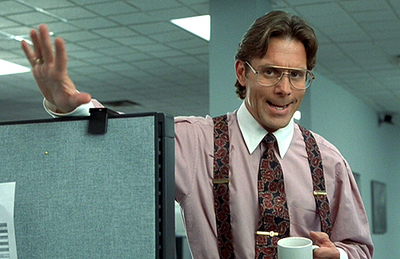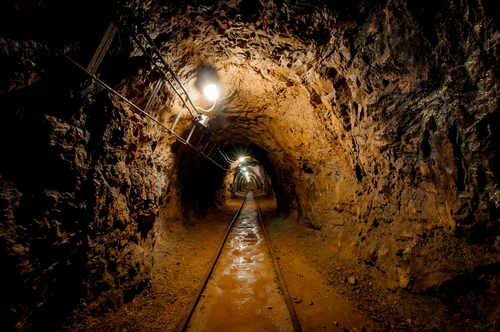Atlas Shrugged, p.34-37
It’s late at night when the first pouring of metal is done, and Hank Rearden is walking home from his mills and reminiscing. He’s reflecting on his past and his climb up the corporate ladder, which gives us a rare opportunity to examine something Rand doesn’t discuss much: her ideas as to how a business should be run.
You might think this a strange statement, considering that this is a book about capitalism, but it’s true. Rand doesn’t spend much time dwelling on what exactly her protagonists do behind their desks day-to-day; it’s more important for her to tell us that they’re bold and decisive and bold than it is to show us what bold and decisive decisions they actually make. The only business decisions she really talks about are the big, risky ventures, the ones where the looters gasp, “That’s impossible!” so that her heroes can humiliate them by proving how much better they are than everyone else at everything.
But as I said, I’m interested in the day-to-day decisions, the minutiae. Just what would it be like in reality to work for one of Rand’s corporate-titan protagonists?
Hank gives us a glimpse of it by recalling his first day on the job. And the memory is a jaw-dropping one:
He saw the day when he stood on a rocky ledge and felt a thread of sweat running from the temple down his neck. He was fourteen years old and it was his first day of work in the iron mines of Minnesota. He was trying to learn to breathe against the scalding pain in his chest. He stood, cursing himself, because he had made up his mind that he would not be tired. After a while, he went back to his task; he decided that pain was not a valid reason for stopping. [p.36]
Admittedly, I don’t know much about iron mining, but it doesn’t seem like the kind of job you can do for a few hours a week after classes, so it’s probably safe to assume that Hank dropped out at 14 to go work in a mine. The text doesn’t specify the nature of the work he was doing, but if it’s the kind that leaves you dripping with sweat and filled with scalding pain, it’s probably not clerical work. So, what we have here is a young teenage dropout employed in hazardous, grueling manual labor. Rand seems to find this entirely unremarkable.

Yeah… I’m gonna need you to go ahead and come in on Saturday, even if you can’t breathe because of that scalding pain in your chest.
But now Hank is the boss, and presumably he runs his business by the same principles. So, what must it be like to work for him? He sees nothing objectionable about 14-year-olds working full-time (how many of them are employed in his mines and foundries?), and since he doesn’t think that physical pain or tiredness are valid reasons for stopping work, I’m guessing he doesn’t offer paid time off or sick leave. I think that would make Hank the classic Boss from Hell. And as the kicker, here’s his life philosophy:
People, he thought, were as hungry for a sight of joy as he had always been – for a moment’s relief from that gray load of suffering which seemed so inexplicable and unnecessary. He had never been able to understand why men should be unhappy. [p.37]
Yes, the boss who sees nothing wrong with working while you’re in agonizing pain can’t understand what people should ever be unhappy about!
Again, this is a dispute that has real-life implications. It matters for surgeons, pilots, truck drivers, and any job that requires a minimum amount of alertness (predictably, the trucking industry is suing over an Obama administration rule to shorten drivers’ maximum weekly hours and mandate occasional rest periods, and deadly plane crashes have been caused by fatigued pilots).
It matters for restaurants and other jobs where employee health is crucial: in New York City, a bill to mandate a minimum amount of paid sick time for employees became a political flashpoint that threatened to derail City Council speaker Christine Quinn’s mayoral campaign. It matters for parents who might occasionally have to take time off work to care for a sick child. And it matters for the economy as a whole, since “presenteeism”, where people come to work when they’re sick and infect co-workers, is estimated to cost over $180 billion annually.
The purpose of the government is to protect its citizens – even Rand admits that, in later chapters where she talks about the necessity of armies and police. But once you accept that, how can you justify the claim that only external threats matter? There’s equally good reason to set basic rules for working conditions to reduce the risk of people (or innocent bystanders) being hurt or killed by their jobs. There are real-world Hank Reardens, no doubt, who fight these rules in the name of slightly increasing their own profit (here’s one of them in Seattle), bellowing about how five days of paid sick time per year puts us on a greasy slide to communist dictatorship and how their lazy, loafing employees need to get back to work and quit whining about their aching knees, their slipped discs and their carpal tunnel syndrome. But it’s only Atlas Shrugged that teaches that this behavior is the noble resistance of a brave hero, rather than the callous selfishness it is.
Image credit: Shutterstock
Other posts in this series:
